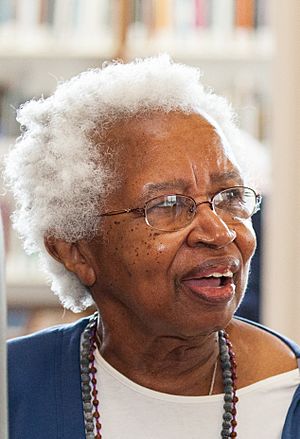Jeannette Brown facts for kids
Jeannette Elizabeth Brown was born on May 13, 1934. She is a retired American chemist, historian, and author. She studied how medicines work in the body. She also writes books about important chemists.
Contents
Early Life and Education
Jeannette Brown was born in 1934 in The Bronx, New York. When she was young, she became sick with tuberculosis. A young doctor named Arthur Logan treated her. He lived in her building.
Dr. Logan inspired her to study science. She asked him how to become a doctor. He told her, "Oh, you study science." Jeannette loved chemistry. She scored very high on her chemistry exam in New York.
She finished New Dorp High School on Staten Island in 1952. In 1956, she earned her first degree in chemistry from Hunter College. She was one of only two African Americans in the first chemistry class there.
In 1958, she made history. She became the first African American woman to get a master's degree. This degree was in organic chemistry from the University of Minnesota. Her master's paper was about how certain dyes form.
Working as a Chemist
After getting her master's degree, Jeannette Brown started working. She became a research chemist at CIBA Pharmaceutical Company. Here, she helped develop new medicines. These medicines fought diseases like tuberculosis.
In 1969, she moved to Merck, another big company. At Merck, she helped write 15 scientific papers. She also helped get one patent and contributed to five others. Patents protect new inventions.
Developing New Medicines
Jeannette Brown's main work was creating new medicine compounds. She helped develop a compound called cilastatin sodium. This compound helps other medicines work better.
For example, cilastatin is used with an antibiotic called imipenem. Imipenem fights serious infections. Cilastatin stops the body from breaking down imipenem too quickly. Together, they form a powerful antibiotic called Primaxin. Primaxin treats severe infections. It also helps fight flesh-eating bacteria and some types of pneumonia.
Jeannette believed that to succeed in science, you need good skills. You must be able to talk clearly about your work. You also need to work well in a team. Plus, you need a strong science education.
Helping Others Learn Science
After 36 years in research, Jeannette Brown started teaching. From 1993 to 2002, she was a visiting professor. She taught at the New Jersey Institute of Technology.
She also helped black students get into STEM fields. STEM stands for Science, Technology, Engineering, and Math. She worked on improving science education in New Jersey. She even tutored middle and high school chemistry teachers.
Jeannette won a grant from the Camille and Henry Dreyfus Foundation. She used this money to help chemistry teachers learn more. She has always worked to make science open to everyone. She was a historian for the American Chemical Society's Women Chemist Committee.
Today, Jeannette Brown still helps young students. She mentors middle and high school students. She does this through the Freddie and Ada Brown Award. She started this award in 2010. It honors her parents.
Work as a Historian
Jeannette Brown is also a science historian. She wrote seven life stories of African American chemists. These stories were for the African American National Biography Project. They included the first African American women to earn Ph.Ds in chemistry.
She wrote a book in 2011 called African American Women Chemists. This book tells the stories of early African American women in chemistry. Her second book, African American Women Chemists in the Modern Era, came out in 2018. It focuses on women who became chemists after the Civil Rights Act.
Inspiring Words
Jeannette Brown has shared many wise words. She advises young women in science to keep going. Even if things are tough, don't give up. "You just got to keep going," she said. "You can't stop. If you stop, you're not going to get what you want."
She also advises students to aim high. "Go straight for a Ph.D. Do not stop at a master's degree," she said. "If you're a Ph.D., then you're the boss." She believes that working hard and learning new things helps you stay young.
Books by Jeannette Brown
- African American Women Chemists in the Modern Era (2018)
- African-American Women Chemists (2011)
Awards and Honors
- 1991: Elected to the Hunter College Hall of Fame
- 2004: Société de Chimie Industrielle Fellow
- 2005: Outstanding Achievement Award from the University of Minnesota
- 2005: National Award for Encouraging Disadvantaged Students into Careers in the Chemical Sciences from the American Chemical Society
- 2007: Association for Women in Science fellow
- 2009: Glenn E. & Barbara Hodson Ullyot Scholar
- 2009: American Chemical Society fellow
- 2020: Henry Hill Award from the American Chemical Society
 | Delilah Pierce |
 | Gordon Parks |
 | Augusta Savage |
 | Charles Ethan Porter |


